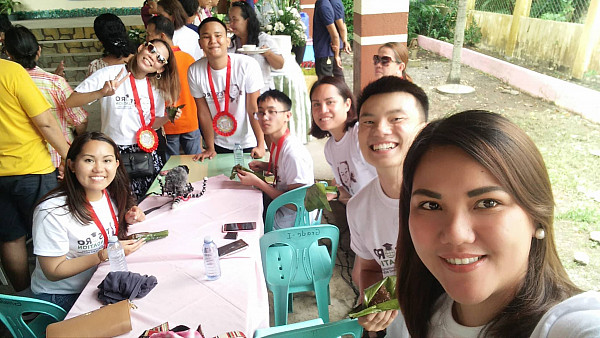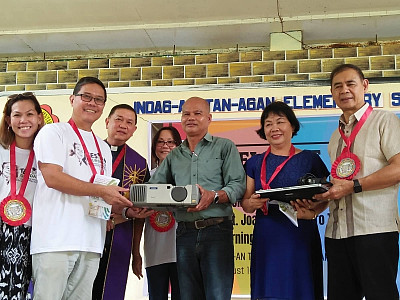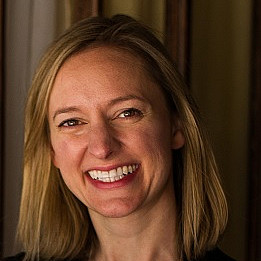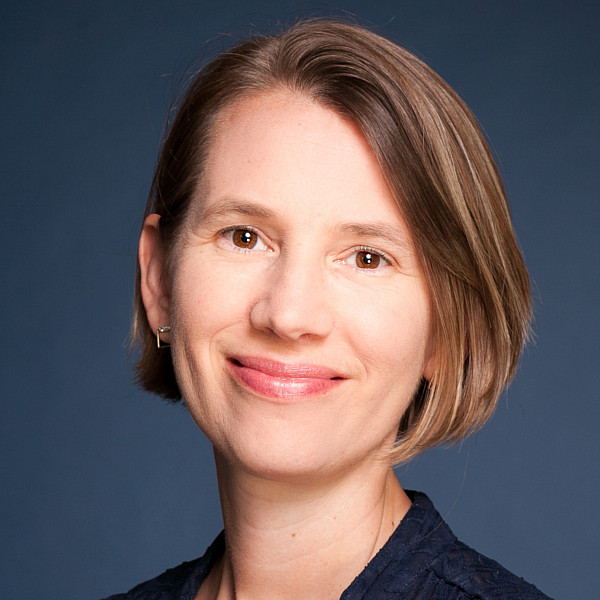News
Connecting the World
Marie Nugpo ’18, Southwestern Information Technology, and the Coalition for Diversity and Social Justice received a certificate of appreciation for bringing learning technology tools to a school in the Philippines.
January 15, 2019
January 15, 2019
Open gallery

On August 10, 2018, an excited throng of teachers, administrators, parents, children, and community members crowded into an outdoor pavilion at Indag-an Tan-agan Elementary School in Miagao, a municipality located in the province of Iloilo in the Philippines. The revelers had gathered to commemorate the generous donation of 18 laptop computers, a projector, and various textbooks to the elementary school, as well as a groundbreaking for a technology learning center. The ceremony “was so much bigger than I imagined,” Marie Nugpo ’18 recalls. “The mayor attended, the vice mayor came, and a lot of town officials from three districts in the area were there.”
Nugpo, a communications major and Spanish minor, was there because she and her family were the primary movers behind the donation. But given her modesty, you’d hardly know that Nugpo was part of the cause for celebration. “I thought we were just going to hand [the computers] over and train the teachers!” she recounts demurely.

A coalition of service
Nugpo and Bradon Phuctong Baccam ’18, both former presidents of the Southwestern Asian Student Association, had traveled to the Philippines to represent a group of SU students and staff who had bonded together over the previous two years to make the service project happen. By the end, volunteers from Information Technology (IT), where Nugpo had worked since her first year at the University, and from the Coalition for Diversity and Social Justice (CDSJ)—especially the Asian Student Association and the Kappa Delta Chi sorority—had participated.
But originally, “it started out pretty small,” Nugpo remembers. It was the fall of her junior year, and, she recalls, “My mom was trying to donate books to an elementary school in the Philippines at the time. Southwestern was having a huge book sale at the end of my junior year, and that’s where I got a bunch of books.” But then Nugpo began talking about their efforts to Technology Support Specialist David Williamson, one of her IT supervisors. Williamson described a project that the University has carried out in past years, in which students and staff would go to Honduras and Costa Rica to donate recycled computer equipment and to help train teachers, school staff, and community members how to use and maintain the laptops and desktops.
The conversation sparked Nugpo’s imagination: why not expand the book-donation project to laptops? Thus began the long process of brainstorming logistics, proposing the initiative, and finding an organization to sponsor it. “That’s where CDSJ came in,” Nugpo says. “When I was able to get the laptops inventoried that IT was trying to get rid of or recycle, I then asked CDSJ if they could help reimage the laptops’ operating systems.” So together with Williamson and other IT staff, Nugpo’s volunteers cleared space on each hard drive, created user accounts for the Indag-an Tan-agan students and teachers, and installed educational programs, such as video games that elementary-school-aged children could play. After months of work on the part of the various University volunteers, Nugpo orchestrated the delivery of the donation to the Philippines, coordinating with the Filipino Nurses Association (FINA) to sponsor the shipments. The final haul included 18 laptops, a projector, and the boxes of books that Nugpo and her mother had collected, including a variety of children’s books, science textbooks, and an encyclopedia set.
The service project at Southwestern, in turn, inspired a local nonprofit in the Philippines, the Tesoro Foundation, to begin building a technology learning center. Nugpo’s connection to the organization is familial: her middle name is Tesoro, and she and the foundation are both named after her late grandfather, who was a teacher and superintendent of schools in the region who was dedicated to improving the education system. With that same spirit, Nugpo’s uncle, Dr. Ferdinand Tesoro, who earned his Ph.D. in industrial engineering from Purdue University, proposed the idea of the learning center, which he is now fully funding. “They’re planning a tech center that will not just contribute to the school, but also the entire community can use it. We’re hoping to hold workshops to train teachers,” Nugpo says. The community will undoubtedly benefit from the program: their access to computers and other equipment is barebones outside the machines provided by Southwestern, and the townspeople need training to maintain and repair them. Nugpo has been working diligently to help make the learning center a reality. “That’s what I’m trying to do: work with organizations on campus, hold fundraisers, and help support the cause.” She’s also building a website and social media for the center.

Southwestern’s Assistant Dean for Student Multicultural Affairs Terri Johnson shares that Nugpo approached her with the idea of the service project in the Philippines “as a way to give back and to offer support to a place that had been hit hard by natural disasters and needed technology support greatly to help them continue to advance. Marie loved her experience at Southwestern and wanted to share this experience with others from her cultural roots and heritage and to work collaboratively with her mom to make this happen.”
Indeed, Nugpo’s roots are in Southeast Asia: she grew up in the Philippines, and she and her three siblings moved to the U.S. with their mother, a nurse, when Nugpo was 11 years old. Nugpo considers her family “very fortunate” for making the move, and she earned her U.S. citizenship last year. But she can still relate to the experiences of the students at Indag-an Tan-agan: “I went to a school a lot like the elementary school. We had five computers—very old desktops—that were not even connected to the Internet. That was my experience: technology wasn’t very available, especially in an educational environment.”
But what truly surprised Nugpo is that in the eight years since she had last traveled home, not much had changed in some areas. “They’ve had development, but the technology is still the same,” she says. “So we planned to build a technology center and make it a collaborative project that is going to make a huge impact, hopefully.”
That desire to give back—and to coordinate a whole community of volunteers in doing so—derives from her Southwestern network and her academic and cocurricular experiences at the University. “The combination of all my involvement here on campus has driven me. In CDSJ and Kappa Delta Chi, we’re focused a lot on activism and service, [on] diversity and having that global perspective,” she reflects. “And being a communication major, we talk a lot about identity and social justice. My immigrant side spoke. I am lucky enough to be Filipina and still connected to the community there.” In addition, Nugpo is grateful for her work family; since graduating in August 2018, she has served as an audiovisual technician for the University: “Hearing about David Williams’s service project inspired me, too. I’m very connected with the staff I’ve worked with in IT. I’m lucky enough to be working there again.” Finally, Nugpo credits her mother’s dedication to philanthropy as a motivator: “Her need and her want to give back influenced me.”

Nugpo, the IT office, the CDSJ, and Kappa Delta Chi all earned certificates of appreciation from Indag-An Tan-Agan Elementary School “in grateful acknowledgement and sincere appreciation for their generosity and invaluable support.” But Nugpo sees this as just a beginning. “Finally being there and being able to hand the computers off … [and] being able to hear everyone expressing their gratitude and being so hopeful” have been the most rewarding parts of the service project so far, but “poverty is still such an issue there.” By continuing to work with the local neighborhood in the Philippines through the Tesoro Foundation, Nugpo hopes to see positive impacts on the schools and communities there. “Students can catch up with the rest of the world in their technology skills,” she says. Being able to communicate with the world beyond the islands will help them make “more of a global connection.”
Making such connections across the world and extending her community from Georgetown to Miagao have been highlights of Nugpo’s undergraduate career. She hopes to continue forging those connections as she researches master’s programs and perhaps pursues a future in documentary filmmaking. For Nugpo, what’s important is “finding something that you connect with—something that’s connected to your identity or that’s a cause that you really want to fight for.” She also cherishes having found like-minded individuals and joined groups who share those causes and values, which empowered her to lead the service project and see it through. “I feel like I’m so connected with the teachers that I’ve had and the staff I’ve worked with in IT and the people in organizations with very similar goals. … There are a lot of activists on campus who are involved in working with minorities and fighting for communities. I definitely want to help promote that,” she says.
That sense of community is what Nugpo values most about her Southwestern Experience. She believes that the support she’s found and the relationships she’s built are unique to the University, but she wants to share that experience with others. “I was lucky to use those [human] resources on campus,” she says. “[They] are always supportive, always there to help. … Those people have a significant impact on who you are.” Nugpo can rest assured that she herself has similarly had a meaningful impact on the lives of her family, her classmates, her coworkers—and a grateful group of teachers, administrators, and young children across the globe.

















